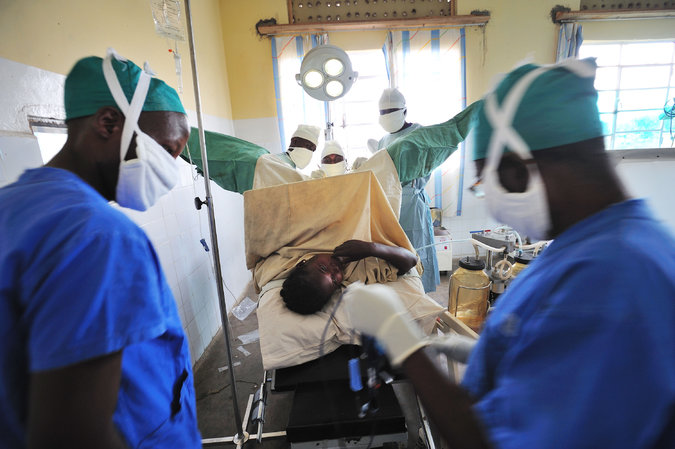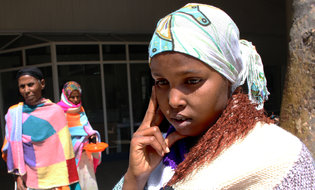PBS: Escaping Eritrea … [Read More...] about ካብ ውሽጢ ቤት ማእሰርታት ኤርትራ
The World’s Modern-Day Lepers: Women With Fistulas
Nicholas Kristof |
ADDIS ABABA, Ethiopia — ONE of the worst things that can happen to a woman or girl around the world is a fistula, an internal injury caused by childbirth (or occasionally by rape) that leaves her incontinent, humiliated and sometimes stinking.
Victims are the lepers of the 21st century, and although the condition is almost entirely preventable, it is suffered by hundreds of thousands of women worldwide.

The condition is invisible because it distastefully involves sex, odor and private body parts, and because victims tend to live in impoverished countries and already have three strikes against them: They’re poor, rural and female, and thus voiceless and marginalized.
They’re the same group that is routinely denied education, denied the right to own property, denied jobs and denied any recourse after being battered, raped or married against their will — and that’s why gender equity worldwide should be a top item on the social justice agenda.
And also on the presidential agenda. America’s presidential race has prompted some discussion of what “women’s rights” mean in 2016. But that discussion has focused inward on America when the most horrific challenges are endured by women and girls abroad — like Marima, who endured a fistula here in Ethiopia.
Marima was a high school student who planned to become a teacher when she fell in love and married another student. She didn’t want to get pregnant but had never heard of contraception, so soon her belly was swelling.
In much of the world, the most dangerous thing a woman can do is become pregnant. Marima tried to deliver at home, and after days of obstructed labor, the fetus was dead and she was left with an obstetric fistula.
A fistula is a hole between the birth canal and the bladder or rectum. Marima had both, leaving her steadily leaking urine and feces through her vagina. In addition, as is common, she had nerve damage called foot drop, so she couldn’t walk.
Marima’s husband abandoned her and took another wife. Marima lay on a piece of plastic on the floor of her brother’s house, unable to move, utterly forlorn and alone, as family members scolded her for the constant stink.
“My sister-in-law said, ‘You’re too smelly; people don’t want to come to our house,’” Marima recalled, crying softly. She stopped eating solid food so that she would leak less feces, and for four months she lay unmoving on the floor and survived on tea and camel milk.
Marima dropped to just 55 pounds. She had bed sores on her buttocks and ulcers on her thighs and genitals from her constantly seeping urine. At 17, she waited to die.

“People said that God had cursed me,” Marima said. “I felt it was better to die than to have this problem.”
Then a family member took her to a branch of Hamlin Fistula Ethiopia, a nonprofit that treats fistulas. Today she is walking again, has recovered weight, and the hole with her rectum has been repaired. Dr. Fekade Ayenachew, the medical director, said he was still figuring out how best to deal with the leaking urine.
Fistulas used to be common in the West, and there was a fistula hospital in Manhattan on the site of what is now the Waldorf Astoria hotel. But once C-sections became available, they largely disappeared.
The way to prevent fistulas is also the way to prevent maternal deaths: Invest more in reproductive health care, including contraception and C-sections. This works: Ethiopia has cut its maternal mortality rate by more than half over 20 years and now aims to cut it in half again over just five years.
Organizations like Hamlin Fistula Ethiopia, the Fistula Foundation and EngenderHealth have shown that where women’s lives are a priority, they can be saved. Proposals to tackle fistula have been introduced in the U.S. House by Representatives Rosa DeLauro and Carolyn Maloney but have stalled.
One simple step would be to help the more than 200 million women worldwide who don’t want to get pregnant but don’t have access to reliable forms of contraception. “If I’d known about birth control, I would have used it,” Marima said.
To her credit, Hillary Clinton did spotlight global women’s issues when she was secretary of state, and Michelle Obama has been promoting girls’ education globally, but this global gender gap hasn’t received attention in this presidential campaign. And frankly, it doesn’t work if it’s only women talking about it; men have to be involved as well.
No doubt this seems like a grim or morbid topic, but there is no happier sight than a woman whose fistula has been repaired. Jamila, 31, another woman treated at Hamlin Fistula Ethiopia, was radiant. “I’m dry!” she declared triumphantly. “I haven’t leaked for six days!”
“Before, I had lost hope,” added Jamila, who had endured a fistula for four years. “I was like a dead person. And now I’ve risen again!”
